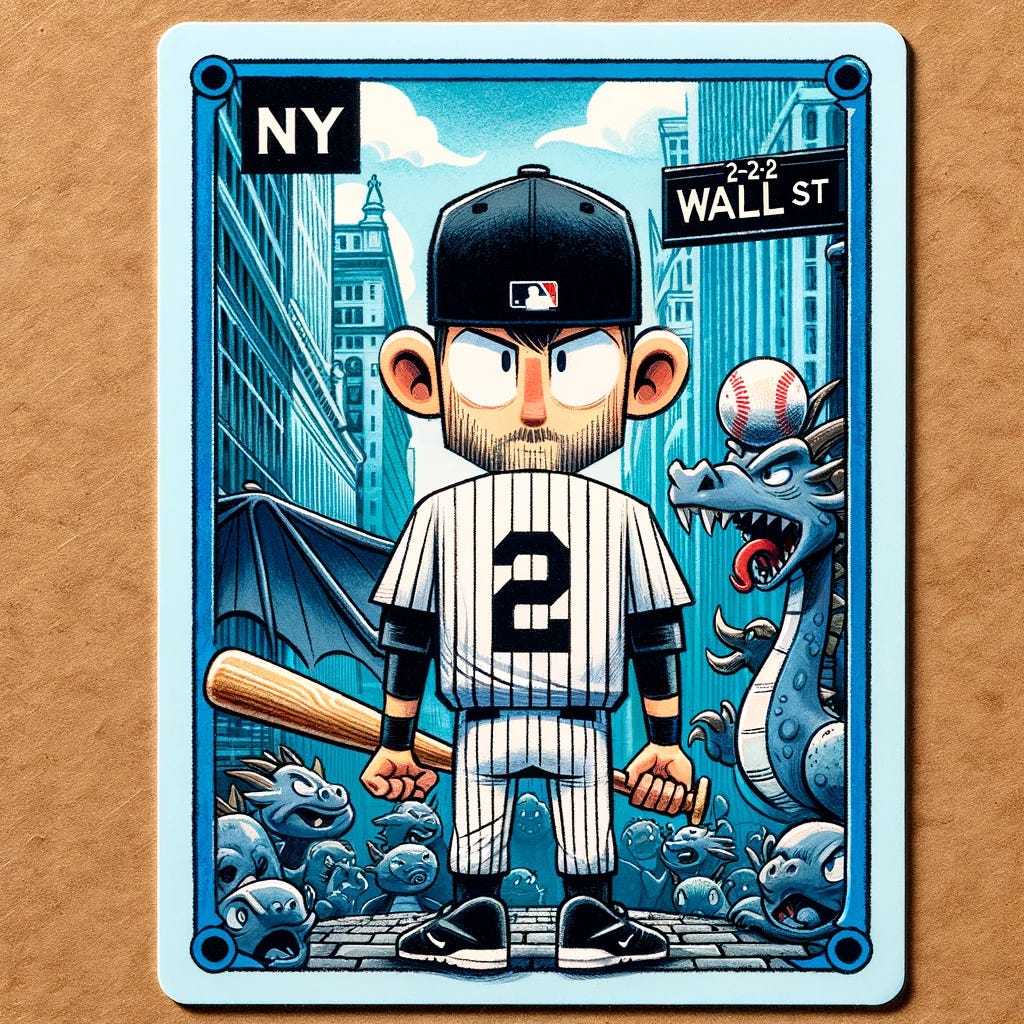Having a roof over your head, food security, and the ability to occasionally splurge on our city's splendidness means you can mark a "W" in the win column of "making it" it in New York City. NYC is a tough place to succeed.
As we approach Opening Day and if you desire a more aspirational example of "making it", look no further than former New York Yankee shortstop Derek Jeter.

If you were a baseball fan between 1996 and 2014, you have a strong opinion on whether Jeter was over- or underrated. He was recognized as the best fielding shortstop in the league five times despite below average fielding metrics. He also keystoned five world championship teams that revitalized the baseball love in a city.
What is not arguable is that Derek Jeter is (1) one of the most memorable NYC icons and (2) one of the best to have ever played the game. This interaction between greatness and icon are a main ingredients towards earning legendary status. This is what 2xParked will be diving deeper into.
NYC Icon
Being a great baseball player does not necessarily earn iconic status. Carlos Beltran, Gary Carter, and Johnny Mize are hall of fame-level players starring for NYC teams with similar career playing values as Derek Jeter, but they do not have the same regard outside of baseball circles. Instead, it is only fair to compare Jeter to the icons whose influence transcends a singular aspect of culture.
I first compared Jeter to some of the most influential artists from our beloved city using Google search terms: Andy Warhol, Jerry Seinfeld, Woody Allen, and Spike Lee.
Despite these artists having social relevance, permanently influencing their mediums, being scrutinized in the public spotlight, and creating art which represents the best and worst of our city's heart and soul, Jeter trumps them all. He out-searched Warhol by 19% this past year.
We see a similar pattern when we compare Jeter to the last few mayors of NYC.
Only Giuliani has been searched more than Jeter, but he is also more relevant in the news. If you remove the week in which he was not surrendering for trying to overturn an election1, Jeter actually has a 2% higher search volume.
Just a quick reminder again that Jeter has not hit a home run since 2014. This popularity pattern holds mostly true when you compare Jeter to the last few MVP winners, i.e. the best of the best in baseball.
Shohei Ohtani is doing things unheard of in professional baseball's 150 years, which leads to no surprise to his popularity. Judge, a prospective NYC icon, has been more searched than Jeter, but if you filter at only the off-season searches, Jeter outperforms Judge in searches two-to-one.
Money Never Sleeps
How does this translate to value? The proxy I will use to answer this is baseball card value. I compared Derek Jeter's rookie card (i.e. his first card) value to comparable players.
To reduce the noise in this analysis,
I used only Topps branded rookies, so differences in branding (e.g. Upper Deck, Bowman, Donruss) would not be an issue.
I looked at only players with rookie cards from 1986 to 1993. This is considered the "junk wax era” when baseball cards were overproduced so the supply is essentially infinite and equal.
I neutralized the impact of card condition, so all cards I looked at were officially considered Gem-Mint condition by PSA.
I used only players elected to the hall of fame. This includes players from Chipper Jones to Ken Griffey Jr.
I looked at the price during the offseason so seasonality would not be much of a factor.
Below I have plotted the career value of the player (wins over a replacement player determined by baseball reference) vs the average selling price on eBay of each player's rookie card. Generally speaking, the more valuable the player was on the field, the higher demand by fans.
You can see one exception. That little red dot outlier is Derek Jeter's 1993 Topps Rookie Card.
This phenomenon has happened before with NYC icons. I looked at the 1965 Topps set, which has a whole slew of hall of fame legends, from Henry Aaron to Willie Mays, and compared the hall of fame player's value on the field to their baseball card value (near mint condition).
We again see a red dot outlier. That is Yankee legend, Mickey Mantle. Mantle, like Jeter, captained many world championship teams in a city starving for success.
An Economy to Himself
Derek Jeter has made $265 Million in just his playing salary. This does not include endorsements or further investments.
When you are determining over- and underrated, you have to have some sort of "rated" baseline. From a purely on-field perspective, he seems to get more attention than he deserves (although he still is a hall of famer). When you add in the intangibles off the field, we might not have enough data to fully measure his impact in our city’s culture. Although since Jeter became the full time shortstop for the Yankees (1996), the only two seasons where the team drew less than 2.5M fans was his first full season and the Covid shortened season. Prior to 1996, there were only 3 seasons in which the Yankees drew more than 2.5M fans in a season.
After every game played at Jeter's former home, Yankee Stadium, Frank Sinatra's New York, New York is blasted. Sinatra proclaims what most New Yorkers feel, "if I can make it there, I can make it anywhere." Jeter's Jordans are quite the expensive vagabond shoes to show that he "made it".
Writing that line felt absurd and frightening.








